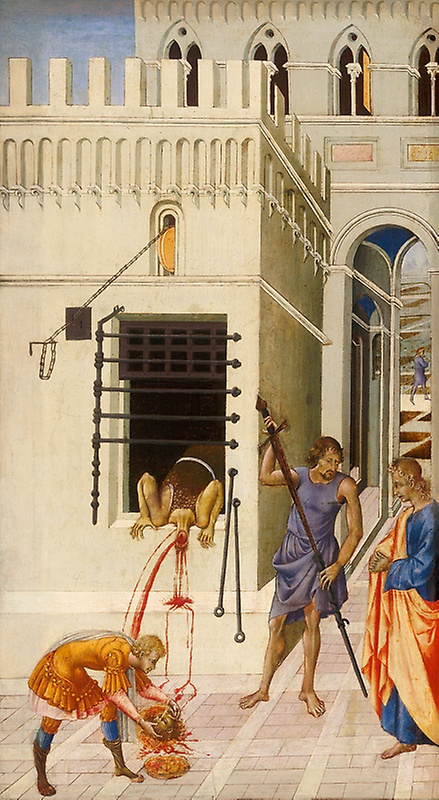 I celebrate as my onomastico or “name day” the Feast of the Beheading of John the Baptist, 29 August. “He must increase,” said the Baptist, “I must decrease” (John 3:30). I need that rule of life.
I celebrate as my onomastico or “name day” the Feast of the Beheading of John the Baptist, 29 August. “He must increase,” said the Baptist, “I must decrease” (John 3:30). I need that rule of life.
St Augustine of Hippo (d 430) connected John’s sudden, violent “decrease”, his head’s removal from his shoulders, with the autumnal shortening of daylight, while the feast of John’s birth coincided with the vernal lengthening of days.
In the Art Institute of Chicago, there is a tempera on panel depiction of the Beheading of the Baptist by the Sienese painter Giovanni di Paolo (d 1482). You view the instant after the deed. Seen from outside the prison, John leans out of his window, guillotine like, his headless shoulders and angled arms still in place as a massive gout of blood jets forth the jutting neck. A servant with a platter stoops for his head. The executioner sheathes his man-length blade.
Speaking of shoulders, the poet Carl Sandburg described Chicago, in defiance of the world’s other great cities, like London, Rome, and Paris. As he explained it, “The poem sort of says, ‘Maybe we ain’t got culture, but we’re eatin’ regular.’” One of the things I regularly eat in Chicago is the indigenous hot dog. I’ve learned to order these like a native speaker by cordially growling, “drag it through da’ garden”, to make sure that all the necessary hot peppers, onions, tomatoes, celery salt and pickles are included. When they weren’t eatin’ so regular here, they loaded up the bun with veggies. What was once famine fare is now a feast.
If you are ever in Chicago, check out “Superdawg” for the best experience.

I digress.
John was not only a martyr for the Truth.
The miraculous son of the elderly priest Zechariah was a priestly martyr.
John stood against Herod and his crony cadre of corrupted priests who backed his violation of the truth of sexuality and marriage.
Herod used his power to sin. John’s blood exposed also priestly corruption in a way that no one could ignore.
By the way, Herod’s command to kill John, the incorruptible priest, came from his lust for a child. Salome was a “little girl” (Greek korásion).
That’s the direction, of course, of the radical and aggressive homosexualist agenda.


































Father, if you haven’t before, go to Jimmy’s or Gene and Jude’s. Much better, especially the fries. And of course, Johnnie’s for a beef.
[Sorry, can’t beat Superdawg. They might cram everything into a box, but… it’s the whole thing.]
I wonder who would be more offended: a Chicago street food vendor serving a hotdog when a tourist asks for ketchup, or Cupich being asked for a blessing in Latin?
[A good question. However, I think we all know the answer.]
Is there really a hot dog in there somewhere!
Something occurred to me as I was reading Mark’s gospel yesterday.
Mark goes out of his way to tell us that Herodias is behind this. She was looking for her chance. “She laid snares for him; and was desirous of putting him to death.”
When Herod promised anything, even to half his kingdom, she had him. She knew that he could not give half his kingdom to a dancing girl. He is a client king of the Romans and even if he wanted to, he couldn’t give away half his kingdom to a young girl. The Romans would never allow it.
So, what if Salome had asked for exactly that? He would have had to go back on his oath in front of his guests and been terribly discomfitted.
We can imagine the dialogue this way.
Herodias: ‘I know you don’t want to do this, but I’m going to go easy on you. I won’t demand half your kingdom and make you to lose face in front of the leading men by abjuring your oath.
Herod: No. Not that….
Herodias: I’m just asking this one little thing… just bring me the head of John the Baptist in a dish here before all your guests who heard your rash promise… I could have made you admit that you can’t give what you promised – your kingdom, but this little thing is something you can give. Just the head of one man. You have got your pleasure from our daughter’s dance. Now let me have mine from this dainty dish.’
S
It was said that it was better to be a pig or a dog in Herod’s court than his child.
I always learn something from Father Z. Today I learned I’ve been eating hot dogs wrong my whole life in the Pacific NW.
@ Fr. Kelly
Reverend Father,
The saying comes from Caesar Augustus himself. It is, however, a reference to the Herod who reigned during the birth of our Lord. His catalogue of other atrocities is not-so-lovingly recited by Josephus. The statement itself was recorded in Macrobius’ “Saturnalia,” in connection with Herod’s most famous misdeeds: and so, we have extra-biblical textual proof of the Massacre of the Innocents.
“Cum audisset inter pueros quos in Syria Herodes rex Judaeorum intra bimatum jussit interfici filium quoque ejus occisum, ait: Melius est Herodis porcum esse quam filium.” (Saturnalia II.4.14)
Thank you @TheCavalierHatherly,
It shows that the apple did not fall far from the tree
Always liked Portillo’s Vienna Red Hots.
Reading about Herod, makes me think nothing has changed politically.
Why I wonder could not he have just said no and refused because it was not a lawful request.